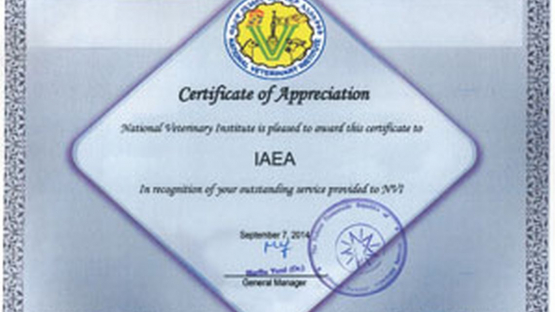In Ethiopia, two veterinary laboratories have benefited from this project: The National Animal Health and Disease Investigation Centre (NAHDIC) and the National Veterinary Institute (NVI); the latter has also served as the pilot laboratory for this project. These laboratories were targeted to enable them to play a leading role (as centres of excellence or confirmatory laboratories) in transboundary animal diseases diagnoses in Eastern Africa. The laboratories were assessed and evaluated by IAEA staff. In order to implement quality assured pathogen detection techniques and fill the main gaps, the project provided the necessary equipment, reagents and consumables, as well as the necessary trainings to support. Staff of the laboratories was trained in the early and rapid diagnoses and control of transboundary animal diseases (such as Foot-and-Mouth disease, Peste Des Petits Ruminants, Avian Influenza, Rift Valley Fever, brucellosis, trypanosomosis, Capripox virus disease, and African Swine Fever) using nuclear and nuclear related serological and molecular diagnostic technologies.

If you would like to learn more about the IAEA’s work, sign up for our weekly updates containing our most important news, multimedia and more.
Ethiopia Awards IAEA for Continuous Support in Veterinary Disease Diagnostics
Since 2011, the IAEA, through the Joint FAO/IAEA Centre, has increased its support to a network of veterinary laboratories (“VETLAB Network”) in sub-Saharan Africa through a project entitled “Strengthening Veterinary Diagnostic Laboratories in Africa for Rapid and Specific Diagnosis of Transboundary Animal Diseases”.
This project is funded through the South African “African Renaissance and International Co-Operation Fund” (ARF) and the IAEA’s Peaceful Uses Initiative (PUI) (USA and Japan). The VETLAB Network comprises of 32 African countries.


IAEA staff undertook expert and training missions to the two Ethiopian laboratories to facilitate on-site training and the transfer of appropriate technologies. Ethiopian laboratory staff visited the IAEA’s Animal Production and Health Laboratory to become more familiar with quality assurance and quality control in the veterinary diagnostic laboratories, and to get acquainted with the complex instrumentation operations, analyses and interpretation of laboratory results. The laboratories also received support to improve their quality management system.
This included on-site visits by animal disease diagnostician at NAHDIC and a quality auditor at NVI. The disease diagnostic inputs and the transfer of technologies by IAEA staff are equally applicable to the other VETLAB Network laboratories to further build their capacities.

As result and a major outcome of the support provided through the PUI project, the NVI received ISO 17025 accreditation from the Ethiopian National Accreditation Office in 2014 (http://www.enao-eth.org/facility+detail.php?id=60) in dictating their proficiency and status as a front line diagnostic laboratory. This was appreciated by NVI in a special award bestowed to the IAEA in 2014.
In addition, through the VETLAB Network, NAHDIC extended the scope of its ISO 17025 accreditation to include real time nucleic acid detection methods in 2014. Both NAHDIC and NVI have now embarked on playing their leading-role in Eastern Africa by hosting regional training courses for the VETLAB Network scientists, and by receiving samples from neighbouring countries to perform first-line or confirmatory diagnoses. It is expected that these two Ethiopian institutions will further increase their regional leading roles under the continued guidance of the IAEA’s Animal Production and Health Laboratory.
The VETLAB Network will continue supporting collaboration and harmonization between the laboratories in Africa, aiming to increase the overall laboratory proficiency, performance and preparedness to respond to animal and zoonotic disease challenges.


